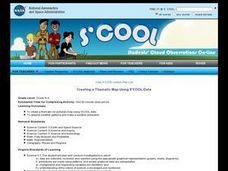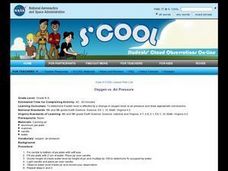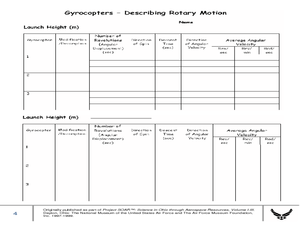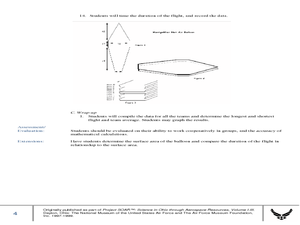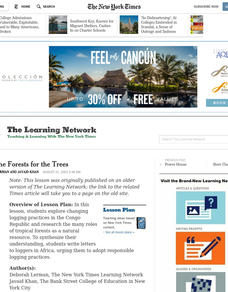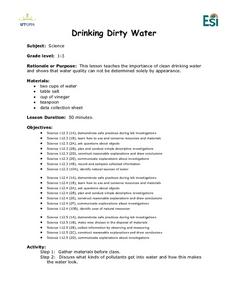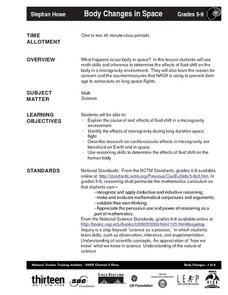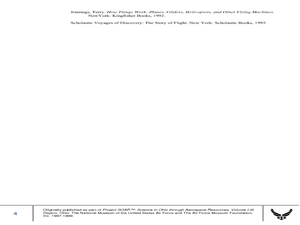Curated OER
Underwater Habitats
Students make a hydrophone and attach it to their Sea Perch ROVs. They use the hydrophones in conjunction with the underwater cameras on the ROVs to explore their local aquatic environments.
Curated OER
Why Don't Whales Have Legs?
Learners are given a variety of materials and are asked to design a heat loss experiment that results in a reasonable explanation of "Why don't whales have legs?" students work with the theory of natural selection.
Curated OER
Creating a Thematic Map Using S'COOL Data
Learners observe weather patterns, collect data, and make a weather predictions for various locations on a map.
Curated OER
Graphing Data - Temperature
Seventh graders measure and record temperature over a given time period. They compare the recorded temperatures to the 40-year recorded normal average temperatures for the same area. Students display and interpret their findings in a graph.
Curated OER
Oxygen vs. Air Pressure
Students conduct an experiment to determine if water level is affected by a change in oxygen level or air pressure.
Curated OER
Gyrocopter - Describing Rotary Motion
Students calculate angular displacement, velocity and acceleration of gyrocopters. In this physics instructional activity, students compare data taken from 3 different gyrocopters. They explain how differences in construction material...
Curated OER
Up, Up and Away with the Montgolfier Balloon
Students construct hot air balloons. In this science lesson plan, students assemble their own balloon using tissue paper and glue. They time the duration of the flight, record data and calculate team averages.
Curated OER
What is a Cloud
Third graders study clouds and how they are formed. They write acrostic poems about clouds and analyze and graph temperature data collected during varying degrees of cloud cover.
Curated OER
Cloud Discovery
Students create a slideshow that pictorially depicts a variety of cloud types. They research clouds, develop and present the slideshow and then evaluate their efforts based on a rubric for self-evaluation.
Curated OER
Seeing the Forests for the Trees
Students explore changing logging practices in the Congo Republic and research the many roles of tropical forests as a natural resource. To synthesize their understanding, students write letters to loggers in Africa, urging them to adopt...
Curated OER
the Wonder of Wetlands
Students explore the importance of the wetland ecosystem, its properties and functions, as well as, the many birds, animals, and plant life found there.
Curated OER
Measuring Water Temperature
Young scholars measure the temperature of three water sources. They collect data points every second for twenty five seconds for each sample using Lego Robolab temperature sensors, complete a worksheet, and analyze the data.
Curated OER
Drinking Dirty Water
Students consider the importance of clean drinking water. They conduct a taste experiment with water, adding incremental drips of salt and vinegar to determine at which point it doesn't taste drinkable.
Curated OER
The Planets Terra Firma
High schoolers explore the theories of the creation of the universe and examine the properties of celestial bodies. They analyze the relationship between the sun, Earth and the other planets.
Curated OER
Cloud Observation and Graphing
Students identify the three major cloud groups. They are introduced to the three main cloud types and spend a week making and recording observations of clouds. Students produce a graph that presents their findings and conduct research...
Curated OER
Mimicking Nature; Science, Aviation, Flight, Wings
Students consider the relationship between form and flight and investigate the history of man made flight and how wing shape and flexibility affects the maneuverability of an aircraft.
Curated OER
Our World A Complex Eco-system
Sixth graders set up an ecosystem, investigate conservation techniques, develop an action plan for conservation, and various other activities to explore the ecosystem.
Curated OER
Termite Biology
Learners explore the physical characteristics, distribution and habitat of termites. The lesson focuses on the termite as a social creature contrary to most other insects.
Curated OER
Body Changes in Space
Learners explain the cause of and effects of fluid shift in a microgravity
environment. Students identify the effects of microgravity during long duration space flight. Learners describe research on cardiovascular effects in microgravity...
Curated OER
Biological Sampling Device Using a Sea Perch
Students construct plankton nets to be towed and collect specimens to be examined and analyzed in the classroom. They develop research skills through collection of an aquatic sample. They write lab reports after interpreting, identifying...
Curated OER
Measurement of the Depth of the Ocean
Students comprehend the physical properties of pressure and Boyle's Law by designing a depth gauge. They construct a capillary depth gauge and calculate the calibrated depth marks of the capillary tube. They determine the margin of error...
Curated OER
Attenuation of Light in Water
Students explore what happens to light intensity as depth increases using a light intensity logger. They construct a PVC model to hold water and identify what factors could influence the amount of light attenuation.
Curated OER
Rocket Physics
Students investigate the relationship between impulse, momentum, kinetic and potential energy and aerodynamic drag. In this physics instructional activity, students calculate data taken from launching a rocket. They compare the...
Curated OER
Parachutes: Is it Surface Area or Shape?
Students investigate how to make a good parachute. In this physics instructional activity, students observe the motion of parachutes as it falls and measure the time. They collect data and calculate the average descent time for each...
Other popular searches
- History and Nature of Science
- The Nature of Science
- Nature of Science Biology
- Nature of Science Inquiry
- Nature of Science Physics
- History Nature of Science
- Science Patterns in Nature
- Genetics Nature of Science
- Teaching Nature of Science
- Nature of Science Weather
- Genetic Nature of Science
- Science and Nature




